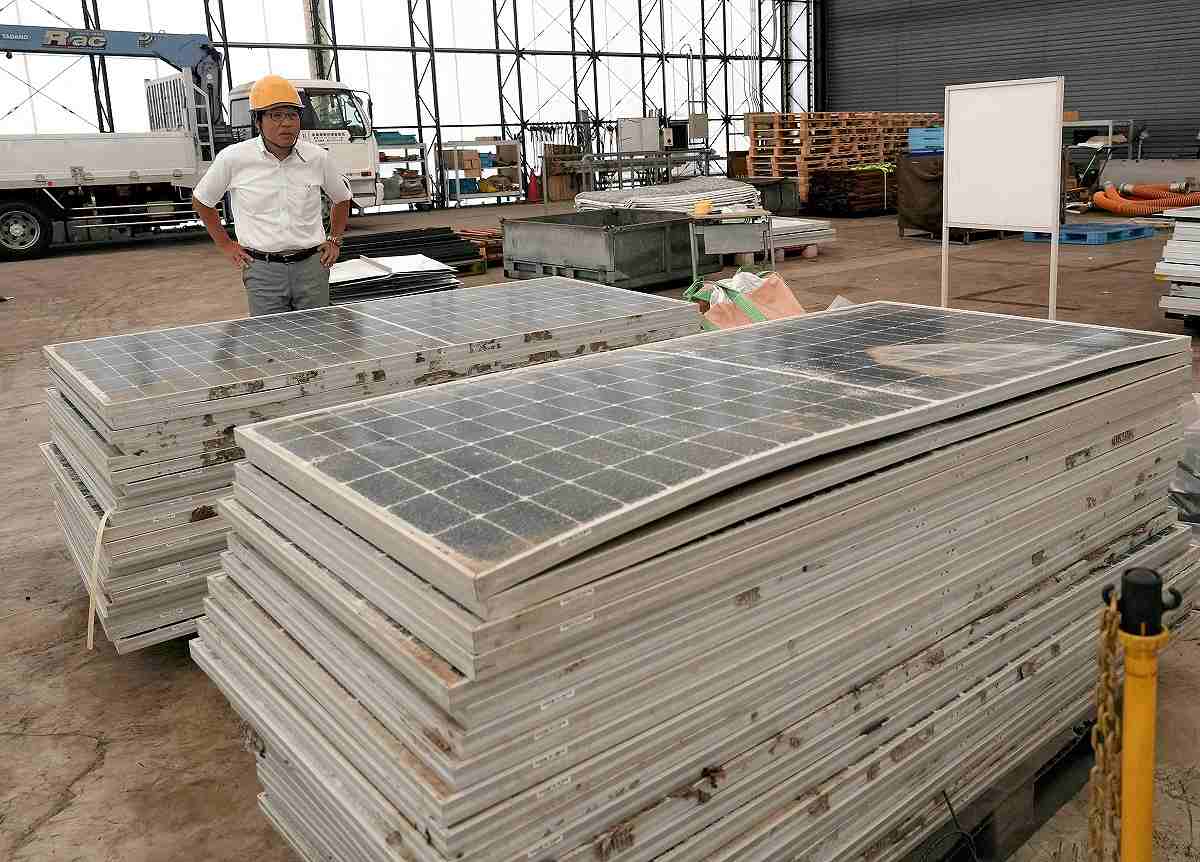
Used solar panels are collected for recycling at a Tokyo Power Technology Ltd. facility in Kawasaki in August 2024.
13:12 JST, January 5, 2025
TOKYO (Jiji Press) — Disposal of used solar panels is expected to be a big problem in Japan in the coming decade after solar power generation spread rapidly following a huge nuclear disaster in 2011.
Many panels have been installed across the country since the March 2011 meltdowns at Tokyo Electric Power Company Holdings Inc.’s Fukushima No. 1 nuclear plant. These panels, which typically last 20 to 30 years, will begin to reach the end of their service life in the next decade.
The annual amount of solar panels discarded as waste is seen peaking at some 500,000 tons in the early 2040s, putting a major strain on industrial waste treatment facilities.
The government plans to submit legislation during the ordinary parliamentary session starting this month to establish a recycling system for the waste. But problems remain.
At present, the annual amount of solar panel waste is below 100,000 tons. But the amount is seen beginning to soar in the mid-2030s and exceeding 300,000 tons by 2040.
Since Japan has no established recycling system for the discarded panels, most of them are buried as industrial waste.
The peak solar panel waste amount of 500,000 tons per year projected for the early 2040s corresponds to 5 pct of the final disposal amount for all industrial waste. This led the government to conclude that mandatory recycling is necessary.
In September last year, the industry and environment ministries began discussions on the proposed establishment of a solar panel recycling system.
Last month, the ministries announced a plan to have panel makers and importers cover the recycling expenses and solar power facility owners pay the demolition costs, while demolition costs for home-use panels would be excluded from the cost-sharing program. The collected funds would be managed by a third-party organization.
Recycling fees would be collected at the time of sale, and demolition costs before the start of power generation. This approach is designed to prevent fund shortages that could happen if any of the makers, importers and facility owners goes out of business before their panels reach the end of their service life.
Upon the completion of demolition and recycling, the third-party entity will make payments through facility owners to demolition contractors and recycling operators certified by the government to have enough processing capabilities.
Solar panels comprise glass, aluminum frames and other materials. Glass, accounting for about 60% of the panel weight, can be reused to make materials such as glass wool, which is used as road construction and insulation materials.
TEPCO subsidiary Tokyo Power Technology Ltd., which engages in solar panel recycling, welcomes the plan to make solar panel recycling mandatory.
“We are grateful that what is buried in landfills will be recycled,” a Tokyo Power Technology official said.
The expected major problem, however, is whether the discarded panels would be supplied to recycling businesses in a stable way after the establishment of the recycling system.
Another concern is that some facility owners may not agree to remove their solar panels even after the end of their service life. Furthermore, damaged glass surfaces could result in leaks of toxic substances like arsenic and lead and in fires caused by electrical leakages.
To prevent illegal abandonment and dumping of solar panels, it would be essential for the central and local governments to cooperate to grasp details of established solar power facilities and ensure that owners dismantle facilities and dispose of panels.
The government aims to find solutions to these problems and draft its final plan for the recycling system early this year.
Top Articles in Science & Nature
-

Japan Institute to Use Domestic Commercial Optical Lattice Clock to Set Japan Standard Time
-

Japan to Face Shortfall of 3.39 Million Workers in AI, Robotics in 2040; Clerical Workers Seen to Be in Surplus
-

Record 700 Startups to Gather at SusHi Tech Tokyo in April; Event Will Center on Themes Like Artificial Intelligence and Robotics
-

iPS Treatments Pass Key Milestone, but Broader Applications Far from Guaranteed
-

iPS Cell Products for Parkinson’s, Heart Disease OK’d for Commercialization by Japan Health Ministry Panel
JN ACCESS RANKING
-

Japan PM Takaichi’s Cabinet Resigns en Masse
-

Japan Institute to Use Domestic Commercial Optical Lattice Clock to Set Japan Standard Time
-

Israeli Ambassador to Japan Speaks about Japan’s Role in the Reconstruction of Gaza
-

Man Infected with Measles Reportedly Dined at Restaurant in Tokyo Station
-

Videos Plagiarized, Reposted with False Subtitles Claiming ‘Ryukyu Belongs to China’; Anti-China False Information Also Posted in Japan























